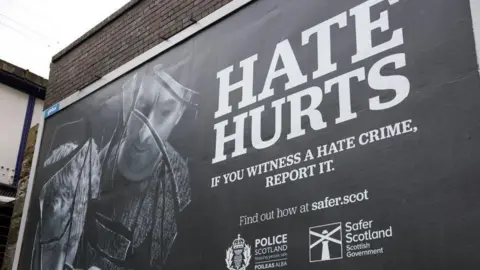Recorded hate crimes in Scotland soar by 63% after law introduced
 Getty Images
Getty ImagesHate crimes recorded in Scotland have increased by 63% since controversial new legislation came into force in April.
Police Scotland said more than 5,400 hate crimes had been recorded in the past six months, most of which have been related to race and age.
The increase followed the introduction of the Hate Crime and Public Order Act, which created a new offence outlawing threatening or abusive behaviour intended to stir up hatred.
Police Scotland said the increase in numbers reflected people being "more confident" in the policing of hate crimes.
More than 7,000 online hate reports were submitted in the first week of the new legislation, although only 240 were then recorded as crimes.
The Crown Office confirmed that 468 of the charges from April to September had progressed to "some form of prosecutorial action".
A total 42 cases have so far resulted in a conviction, with more than 80% of the cases still working their way through the courts.
Convictions so far
Alan Speirs, deputy chief constable with Police Scotland, said the legislation had seen a "significant difference in confidence" from people reporting hate crimes now.
He added that the "most significant" number of cases related to either race or religion, and were most common in Dundee, Edinburgh or Glasgow.
A spokesman for the Crown Office and Procurator Fiscal Service (COPFS) said "careful consideration" was given towards any case.
He added: "In the very short time since the legislation came into force, 468 charges have been reported to us with some form of prosecutorial action taken in relation to almost 94% of the charges reported. Forty two charges have resulted in a conviction with a further 82% of charges ongoing in court.
“As one would expect in such a short time many of the charges reported are still ongoing in court and it would not be prudent to make any assumptions regarding the efficacy of legislation at such an early stage.”
The legislation was introduced in April with the intention of extending protection for those considered most at risk of hate crimes, based on disability, race, religion, sexual orientation and transgender identity.
The bill streamlined the law by bringing together existing hate crime laws into a single piece of legislation while creating a new crime of "stirring up hatred" against protected groups.

However the bill - which has a maximum punishment of seven years in jail - provoked fierce debate in the Scottish Parliament and on social media, with proponents of freedom of speech arguing the law was too vague.
Author JR Rowling was a vocal critic, arguing it would affect people who expressed concern over the impact of trans rights on women.
The new statistics revealed that the attention on gender proved "disproportionate in the number of reports relating to this" with race, religion and age much more prevalent - about 300 cases related to a person's age.
DCC Spiers said there had been "no crimes of mis-gendering reported at all" since the legislation was introduced, and that the "vast majority" of hate crimes would have been classed as such under previous laws.
He said the first few days of the law had seen a "mischievous discussion" started to criticise the law, which had since settled down.
The Scottish government's Community Safety Minister Siobhian Brown said people were making "fake and vexatious complaints" within days of the legislation being introduced, with a number centred on the then First Minister Humza Yousaf.
Police Scotland said the wave of early numbers had subsided since then.
A total of 679 hate crimes were directed towards on-duty police officers and staff.
About 10% of the hate crimes proved to be non-crime hate incidents (NCHIs).
Brown told BBC Scotland News: "Hatred and prejudice has a damaging and corrosive impact on victims and wider communities.
"It is vital that everyone in Scotland feels safe, and this data shows hate crime laws are being used to hold to account those who target vulnerable communities and commit criminal acts fuelled by hatred and prejudice."
